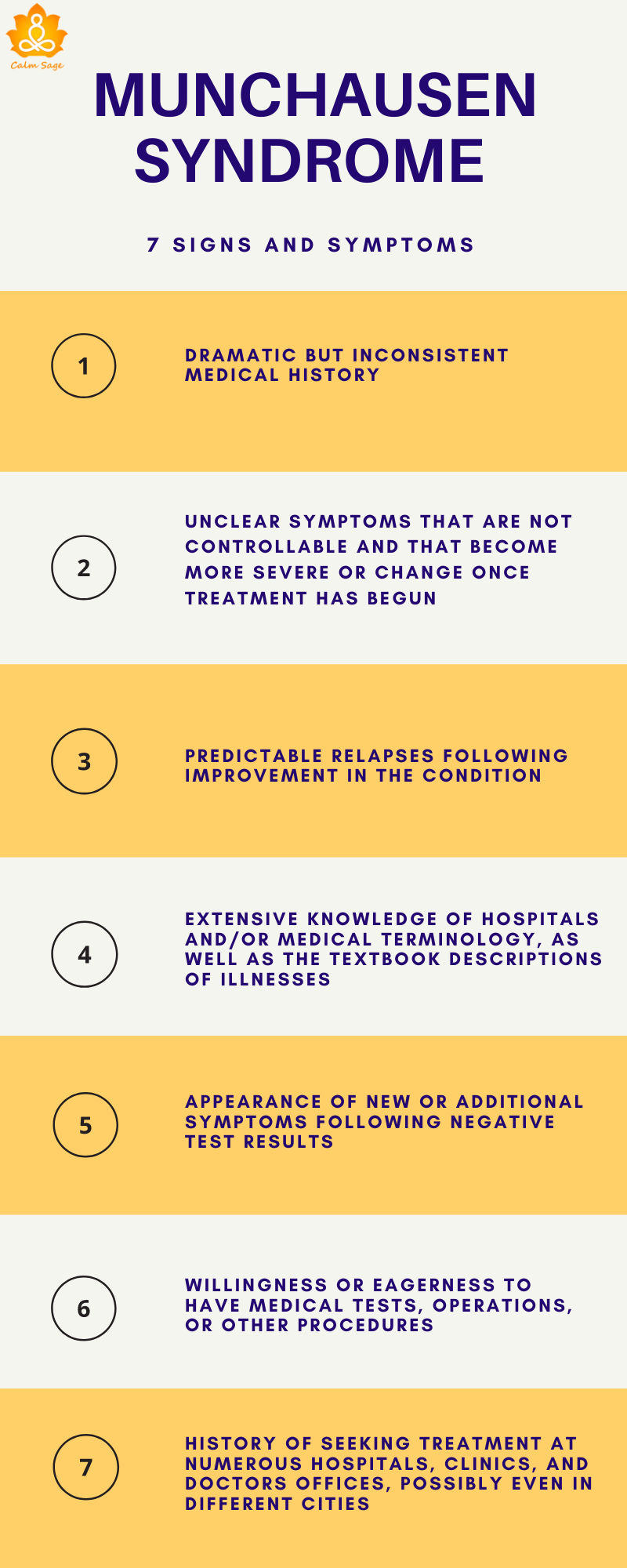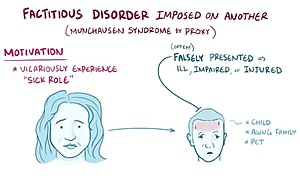What is Munchausen Syndrome (Factitious Disorder)and How To Treat?

Summary:
- Munchausen Syndrome is a rare type of mental disorder in which a person tries to show physical or mental illness even when they do not have anything.
- It is usually tough to diagnose exactly as the person tries to fake the illness.
- Munchausen Syndrome By Proxy (MSBP) is different from Munchausen syndrome and represents a condition where the child fakes or produces symptoms of someone else. It is now called as ‘Fabricated or Induced Illness by Carers’ (FIIC).
What is Munchausen Syndrome?
Munchausen syndrome, also called a factitious disorder, is a mental disorder where a person acts like they are dealing with physical or mental issues by faking them.
The person going through it tries to complain or exaggerate symptoms of a certain illness that doesn’t really exist. Such conditions could be seen amongst young adults and may also be known as potential self-harm.
However, the name Munchausen syndrome is now classified as ‘Factitious disorder imposed on self’ in the Diagnostic and Statistical Manual of Mental Disorders (DSM-5).
One shall note that the person pretending to be ill doesn’t do that for personal gains but he or she acts in such a way because of psychological reasons like sympathy or attention gain.
Symptoms Of Munchausen Syndrome?
As we know that Munchausen syndrome makes the person exaggerate the symptoms, the person could act extremely manipulative and may show dishonesty and deception. Some other symptoms could be:
- Collection of unrelated symptoms
- Purposely injuring oneself in order to cause illness (Essential 4 steps for Suicide prevention)
- Exaggeration of actual injury leading to unnecessary medical intervention
- Frequently visiting doctors and undergoing medical tests
- Requesting surgeries and medical procedures
- Reporting themselves as depressed or suicidal even if nothing is diagnosed
- Manipulating laboratory test reports to find false reports
- Despite medical treatments, they fail to improve at all
Apart from the above-mentioned Munchausen disease symptoms, there are other presentations a person can show up and they may even act as a warning sign. Such signs are:
- Pretending to be in pain
- Complaining new symptoms after finding a negative test report
- History for getting treatment at several hospitals or doctors’ clinics.
- Extensive and inconsistent medical history
- Symptoms show up only when the person is all alone by himself or being observed
- Continuous eagerness to visit hospitals and get the tests done
How Is Munchausen Syndrome Diagnosed?
Note that Munchausen syndrome could be really hard to diagnose due to the dishonest nature of the person. This is why doctors go through proper physical and psychological examinations to rule out all the possibilities.
Once done, there are a few mentioned criterias based on which diagnosis is made.
- False physical and psychological symptoms which are also associated with identity dissociation.
- A person acting as ill, impaired or injured.
- Such deceptive behavior remains common despite no external rewards.
- It cannot be explained under any psychological disorder.
What Are The Causes Of Munchausen Syndrome?

There are no exact causes of self-diagnosis disorder and it is also not clear how many people are affected by it. However, the reasons behind this complex condition are:
- Childhood neglect or abuse which makes a person an attention seeker
- Childhood hospitalization where a person connects themselves with the same feelings and discomfort
- Existence of personality disorder
Munchausen Syndrome By Proxy (MSBP)

This syndrome is a serious form of abuse as the person fakes symptoms of disease in someone else, usually their own child. This is why it is also considered as child abuse or victim abuse rather than the medical condition alone in some countries.
In the case of ‘Fabricated or Induced Illness by Carers’ (FIIC), the person may even try to poison or harm the child in order to go ahead with medical procedures and operations. Although it is a rare condition, it needs to acknowledged for every woman who is playing the role of caregiver anywhere around the world.
Treatment For Munchausen Syndrome
The person dealing with self-diagnosis disorder would not easily accept what he or she is going through. Hence, treatment has to be initiated from someone else who can pursue them to undergo it.
1. Psychotherapy:
Psychotherapy is meant to change a person’s behavior by providing mental health counseling. During the sessions of cognitive-behavioral therapy, the therapist tries to uncover the underlying causes of behavior and help them in changing the course.
Just like individual therapy, the treatment may also include family therapy and family members are taught the ways to respond and cope with syndrome.
Book Your Therapy Appointment Here
2. Medication:
Medication is not typically prescribed for Munchausen syndrome but if the patient is experiencing anxiety, depression or other mental challenges then they are provided accordingly.
Conclusion
We hope that you have understood Munchausen syndrome and how Munchausen syndrome is different than Munchausen syndrome by proxy. This article might have also helped you with finding symptoms of Munchausen syndrome and urge to connect with an expert immediately.
If you wish to consult the expert online, just drop us a message at info@calmsage.com today.
Next Read:
Warning Signs of Emotional Abuse in Relationships!
15 Psychology Based Self-Regulation Techniques For Adults & Children
Emotional Abuse: Signs, Impact, and Measures| Stop Suffering in Silence
Impact of Substance Abuse on Your Health and How It Can be Treated




















